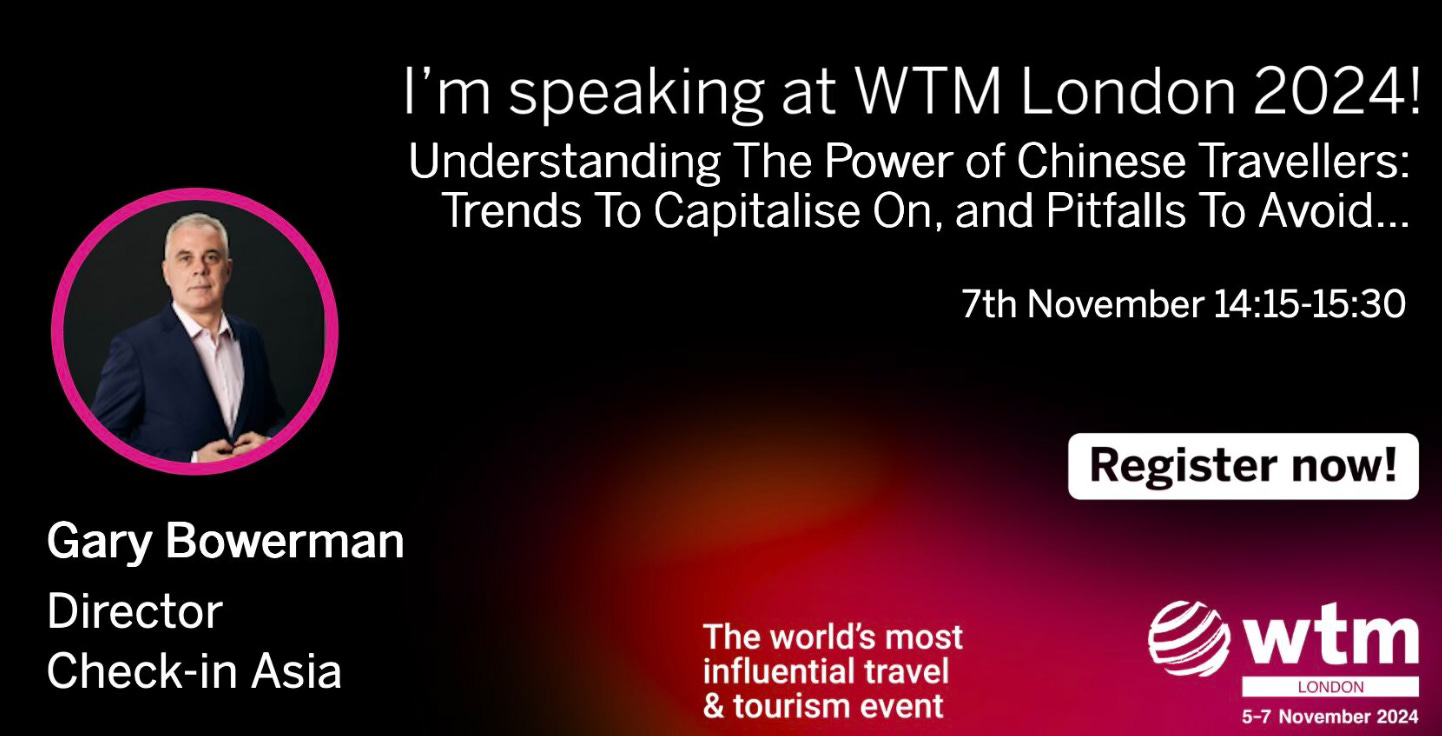Issue #161: 5 'AI in APAC Tourism' Takeaways from ITB Asia
AI in the tourism eco-system dominated this week's big travel bash in Singapore.
Welcome to Issue 161 of Asia Travel Re:Set.
AI. Sustainability. Over-tourism.
The 3 dominant threads of this week’s ITB Asia conference programme in Singapore.
AI in (all aspects of) travel was by far the most-debated topic.
So let’s follow that train of thought…
Thanks for checking in.
China's outbound recovery is a work in progress, but 2024 has seen greater activity and new patterns of trip-making. So, what happens next? I'll be joining a panel entitled: Understanding The Power of Chinese Travellers: Trends To Capitalise On, and Pitfalls To Avoid… at World Travel Market in London, with Mingjie Wang, Alhasan Aldabbagh, Sienna Parulis-Cook, Emanuel Lehner-Telič and Dave Goodger.
Hope to see you there!
5 ‘AI in APAC Tourism’ Takeaways from ITB Asia
Few travel topics exist in a thicker fog of hyperbole than AI. Used interchangeably for a large spectrum of business processing and generative home-use applications, AI is now the lingua franca of tech-in-travel debates.
Iterations of AI are rapidly being integrated across the tourism industry throughout Asia Pacific. Common consensus is that these are early days.
So, here are 5 thoughts from this week’s ITB Asia conference and trade show.
1) The New Big Thing or the Next Big Thing?
It’s generational. The “Human Touch” is a concept the travel industry has always used to self-actualise. Travellers, it maintains, ultimately want/need/prefer interaction with humans, whether for a trip-planning enquiry or booking issue, checking-in at an airport or hotel (and in the ride to/from each), eating in a restaurant or touring a local community. Except, as a Chinese travel exec noted this week, “Young people don’t want to talk in person to anyone.” They wish instead to interact with chatbots and AI concierges via their phones or other forms of tech. So, the answer to the headline question won’t just depend on who you ask - but also the format they use to respond.
2) Same, Same - Where’s the Differentiation?
Version 2.0s, please. Several travel tech firms showed their new AI-enabled content solutions for hotels, airlines, airports, retail chains etc. Some that I saw (including one built for a European carrier) looked very similar. Templated, multi-level destination guides with lots of keyword cross-searches and service overlays. Two issues: 1) Such high-speed tools are tricky to demo in a trade show hall with over-subscribed public wifi; 2) Most wouldn’t work for Asian consumers: too much text, not enough video and the AI-generated “contemporary sepia” photos look what they are, artificial.
3) AI & Hotel Economy Turnarounds
Hotels as e-retailers? It is widely agreed that hotels have plenty to gain from using AI to remodel their revenue strategies. By their own admission, hotels don’t effectively aggregate and optimise their diverse data feeds - let alone integrate external sources. The smartest hotel groups are bringing in expert technicians from fields such as banking and entrepreneurs that created and exited tech startups. Some are cautious about where they can venture to in the near term beyond chatbots and back-office reorganisation. Others are ambitiously looking into mobile retailing. Worth watching.
4) Is Trip.com an OTA or an AI Agent?
Both. Two presentations by Trip.com executives provided cogent and highly detailed case studies of how OTAs might counter the threat of AI agents - by becoming AI agents themselves. The group’s radical content strategy rethink (which I previously wrote about here and here) during Covid is starting to be harvested.
More on this very soon!
5) Who Works for Whom?
Digital Employees. I enjoyed an engaging session by Singapore-based Atlas, which provides LCC flight content and services to OTAs and travel agents. Starting with Athena, its China-based tech team created a handful of “digital employees” that scour LCC booking code 24/7 in search of holes. The goal is to prevent users receiving a dreaded on-screen “Error” message during a booking, and improve conversion rates. So, could Athena and her small team of AI counterparts replace human staff? The answer, spanning both ‘potentially yes and no’, was more nuanced than you often hear.
More on this very soon!
And, that’s a wrap for issue 161.
Asia Travel Re:Set will return next Sunday.
Meanwhile, find me at LinkedIn, The South East Asia Travel Show and High-Yield Tourism.
Happy travels,
Gary







